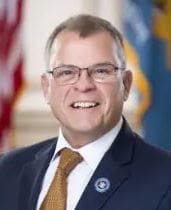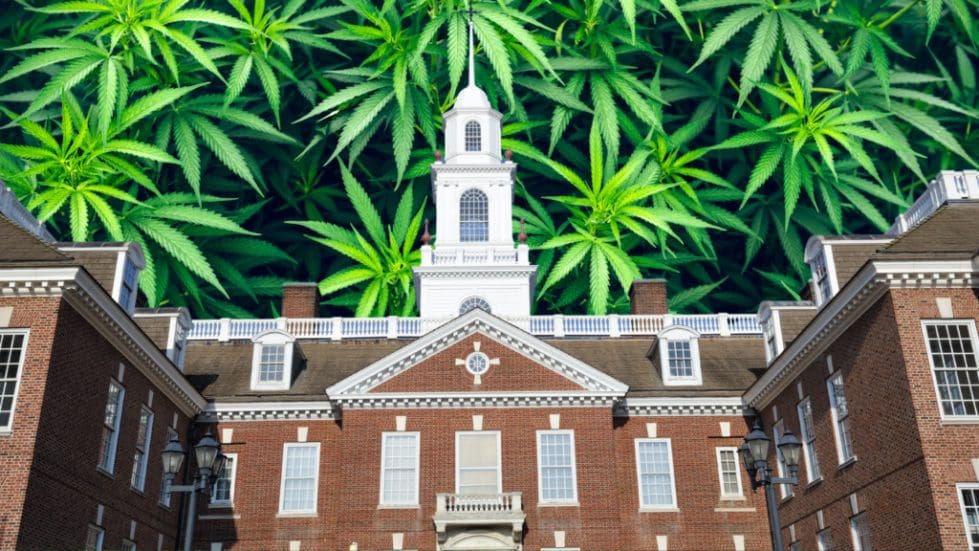

Personal possession of marijuana will be legal as of Sunday, April 23. It will take longer to build the framework of an industry.
Gov. John Carney said Friday that even though he disagrees with legalizing marijuana and creating a regulated and taxed industry, he will allow the two bills that do that to become law without his signature.
“I want to be clear that my views on this issue have not changed,” he said in a Friday afternoon press release. “I understand there are those who share my views who will be disappointed in my decision not to veto this legislation.
“I came to this decision because I believe we’ve spent far too much time focused on this issue, when Delawareans face more serious and pressing concerns every day. It’s time to move on.”


Gov. John Carney
House Bill 1, which decriminalizes marijuana possession for personal use, will become law at the end of Saturday night. It takes effect Sunday, April 23.
House Bill 2, which creates a taxable, regulated industry for the growing and selling of marijuana, will become law at the end of Wednesday night. It takes effect Thursday, April 27, but it’s like to be months to a year before the regulations are put in place that allow the industry to take root.
Carney made his announcement one day too late for marjuana advocates to celebrate when they light up on April 20, also referred to as 4/20. That day has become a kind of holiday for those who want weed legalized across the country.
“As I’ve consistently said, I believe the legalization of recreational marijuana is not a step forward,” Carney said in his press release. “I support both medical marijuana and Delaware’s decriminalization law because no one should go to jail for possessing a personal use quantity of marijuana. And today, they do not.”
Rep. Ed Osienski, D-Newark, has repeatedly introduced versions of the bill to legalize marijuana use. The one that passed last year was vetoed by Carney and could not be overcome by the state House.
When he reintroduced the bills this year, Osienski said he thought there was a chance that he would have better luck in the governor’s office.
The governor’s office suggested changes on the industry bill, which passed in an amendment.


Rep. Ed Osienski
And earlier this week, Carney told a town hall meeting that he thought the state had more pressing problems, including lost learning because of COVID-19 and the opioid epidemic, and had spent too much time focusing on marijuana.
“After five years of countless meetings, debates, negotiations and conversations,” Osienski said, “I’m grateful we have reached the point where Delaware has joined a growing number of states that have legalized and regulated adult recreational marijuana for personal use. We know that more than 60% of Delawareans support the legalization of marijuana for adult recreational use, and more than two-thirds of the General Assembly agreed.”
He said he understood the governor’s personal opposition to legalization.
“So I especially appreciate him listening to the thousands of residents who support this effort and allowing it to become law,” Osienski said. “I am committed to working with the administration to ensure that the effort to establish the regulatory process goes as smoothly as possible.”
Marijuana reaction
Senate Minority Leader Sen. Gerald Hocker, R-Ocean View, said he expected Carney to veto the bills because it was clear this year that there were enough votes to override a veto.
“Let [the veto] happen, you still show where you stand on it. He didn’t show us anything,” Hocker said Friday. “He took a stance in the 151st but he took no stance in the 152nd…That’s a chance you got to take but you’ve got no chance if you don’t veto it.”
Hocker said he was surprised Carney simply let the bills become law.
“It tells me he’s playing both sides is what it tells me,” Hocker said. “You veto it one session then let it become law in another session.”
Delaware State Troopers, who were featured in advertisements asking Carney to veto the bills, declined to comment on the governor’s move.
House Minority Leader Ramone, R-Pike Creek, said he wasn’t bother by the decriminalization but was disappointed in Carney.
“I’m obviously a big supporter of medical marijuana,. I think marijuana was on track to be legalized at some point,” Ramone said. “I thought it was more prudent to do that when and if the federal government takes it off the schedule one drug, which would then allow the federal government to regulate it across the entire nation, rather than the state of Delaware trying to do this in a way that’s basically breaking the federal law.”
Ramone said he expected this move when he and others didn’t get a call.
“We kind of knew that he was probably going to just let it pass without signing it,” Ramon said. “The governor is the governor and he gets to make those decisions. So that’s what we get.”
I think the intent was from the beginning when I didn’t get the call or when others didn’t get the call…We kind of knew that he was probably going to just let it pass without signing it.”
Carney said in his statement Friday that he worries about how a legal recreational marijuana industry will affect Delaware.
“I’m concerned especially about the potential effects on Delaware’s children, on the safety of our roadways, and on our poorest neighborhoods, where I believe a legal marijuana industry will have a disproportionately negative impact,” Carney said. “Those concerns are why I could not put my signature to either House Bill 1 or House Bill 2.”
Carney said he knew many legislators disgree with allowing marijuana to become legal for those 21 and older.
“I also do not believe prolonging debate on this issue best serves Delawareans,” Carney said. “Delaware families want great schools for their kids. They want good jobs and affordable, safe communities free of crime. And they expect – rightly so – that we’ll spend taxpayer dollars in a way that’s both responsible and sustainable.
“That’s where we should focus our time and energy in the weeks and months ahead.”
Carney pledged to do “everything in our power to protect children from accessing marijuana and marijuana-related products; prevent Delawareans and Delaware visitors from driving under the influence of marijuana; and closely evaluate the placement of marijuana dispensaries and other businesses, to ensure they do not become a blight on already disadvantaged communities.”
Now, he said, “My goal will be to ensure that Delaware has a robust regulatory system that protects the interests of the most vulnerable Delawareans, to avoid the many challenges we’ve seen in other states, and to get back to focusing on issues that are most important for Delaware families.”
Sam Haut contributed to this report.


Betsy Price is a Wilmington freelance writer who has 40 years of experience, including 15 at The News Journal in Delaware.
Share this Post



